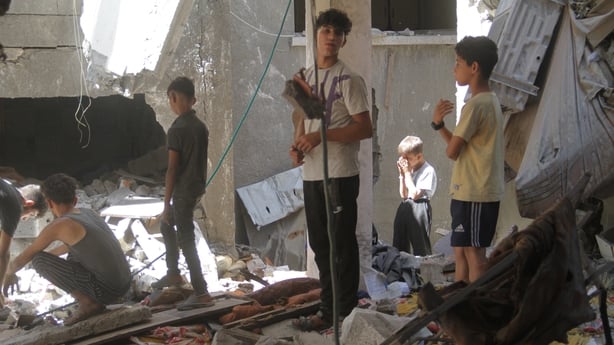Tánaiste Micheál Martin has said there needs to be a "serious de-escalation" of conflict in the Middle East, adding that Israel's military campaign in Gaza is "no longer just against Hamas" but "a war on the entire population".
Speaking on RTÉ’s News At One, Mr Martin said he is "extremely worried" that the conflict in the West Bank is becoming an extension of Israel’s war in Gaza.
"There has to be really a serious de-escalation of conflict in the region," he said.
"It’s a war on the entire population now, it’s no longer just a war against Hamas."
He said this type of modern warfare that attacks an entire population, and its infrastructures like housing, hospitals, schools, and waste management treatment centres is "morally unacceptable and cannot be sustained."
The Tánaiste called for an immediate ceasefire in Gaza, the release of all hostages and for adequate humanitarian aid to be delivered.
"The real concern now is that we are beginning to witness an extension of that war into the West Bank, maybe waged differently, but essentially it will be the Palestinian population on the ground, women and children again, who will bear the brunt of such an assault."
We need your consent to load this rte-player contentWe use rte-player to manage extra content that can set cookies on your device and collect data about your activity. Please review their details and accept them to load the content.Manage Preferences
It was beyond comprehension, he said, why Israel would seek to militarily escalate the situation when de-escalation was urgently needed.
He described comments from Israeli government ministers who have endorsed the introduction of settlements in the West Bank as "extraordinary and inflammatory".
'Cannot be business as usual' - Tánaiste
The Tánaiste said that anyone who supports, aids and abets settlements should be subject to sanctions because such remarks render any development of a two-state solution unviable.
He added that violent and aggressive types of settlements are now under way, meaning forced displacement of Palestinian farmers from their land, and aggression within particular towns and by-sectoral communities, which he said was not acceptable.
"This is just one further lever that we could use. That will be discussed today... certainly, it is an issue that will be on the agenda," he said.
He added that it’s a difficult time in the relationship between Israel and Ireland, but the Government is looking at the conflict in the Middle East through a lens of international humanitarian law, and the need for a political horizon.
Regarding the EU reviewing its association agreement with Israel, the Tánaiste said there had been "little progress".
However, he said the International Court of Justice's advisory opinion on Israel’s illegal occupation of the Palestinian territories placed obligations on member states in the European Union and the European Union itself on how it conducted relations with Israel.
"I don't think that can be stonewalled anymore or any further, and it cannot be business as usual," he said.
"And Ireland domestically will have to take that into account as well in terms of our relationship in respect of the illegal occupation."
He said this means Ireland cannot engage in activities that further the illegal occupation.
"Not all aspects of trade, but certainly, for example, there has been speculation about procurement of military activity.... that sort of thing will not happen.
"We will not be procuring military equipment or defence equipment, or contracts with Israel."

EU considering limited sanctions
Mr Martin also said that Ireland will support recommendations by EU foreign policy chief Josep Borrell for sanctions in respect of settlers organisations facilitating the expansion of settlements in the West Bank and in respect of some Israeli ministers
Mr Borrell has said he has started the process of asking member states if they want to impose sanctions on "some Israeli ministers".
"I initiated the procedure to ask the member states if they consider (it) appropriate to include in our list of sanctions some Israeli ministers (who) have been launching unacceptable hate messages against the Palestinians, and proposing things that clearly go against international law," he told reporters ahead of a meeting with EU foreign affairs ministers in Brussels.
He did not name any of the Israeli ministers to whom he was referring.
Diplomats say it is unlikely the EU would find the necessary unanimous agreement among its 27 members to impose sanctions on Israeli government ministers.
But Mr Borrell's decision to float such a proposal indicates the level of anger among some European officials about some Israeli ministers.
Additional reporting Reuters
